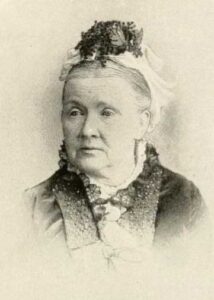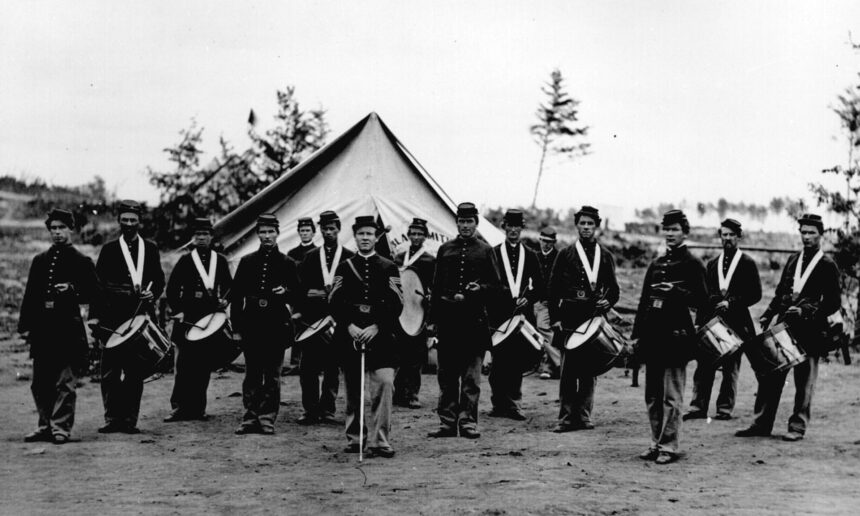The “Battle Hymn of the Republic,” penned by published poet Julia Ward Howe over 160 years ago during the Civil War’s early years, is woven into the fabric of American life. Played by bands on patriotic holidays, sung in countless churches, and a staple of marching parades, the song transcends its age.
A Vision of Divine Justice
Howe’s powerful lyrics, invoking an apocalyptic vision of a just God wielding lightning and a sword, resonated deeply with the Union cause – a fight for freedom for all. The song’s message continues to inspire soldiers and civilians alike, presidents and ordinary citizens. It’s become a cornerstone of American cultural history and a powerful example of how faith can intertwine with patriotism.
In 1861, Howe and her husband, Samuel, visited Union troops near Washington, D.C. A surprise Confederate attack forced their departure. On the return trip, their carriage was surrounded by Union soldiers marching to the popular army song “John Brown’s Body.” The catchy tune, their patriotic spirit, and the earlier skirmish sparked Howe’s inspiration for the “Battle Hymn of the Republic.”
Something of Importance
Howe penned a poem that very night, “Mine eyes have seen the glory of the coming of the Lord,” a perfect fit for the familiar tune. Howe later described the event:
“I went to bed and slept as usual, but awoke the next morning in the gray of the early dawn, and to my astonishment found that the wished-for lines were arranging themselves in my brain. I lay quite still until the last verse had completed itself in my thoughts, then hastily arose, saying to myself, I shall lose this if I don’t write it down immediately. I searched for an old sheet of paper and an old stub of a pen which I had had the night before, and began to scrawl the lines almost without looking…. Having completed this, I lay down again and fell asleep, but not before feeling that something of importance had happened to me.”
Howe’s “something of importance” became the iconic lyrics brimming with biblical imagery for the “Battle Hymn of the Republic.” In February 1862, she sold the poem for publication to the respected Atlantic Monthly for a few dollars. The song quickly became an anthem for Union troops and supporters, a powerful message aimed at the South. Ironically, the original melody came from a Methodist hymn by Southerner William Steffe.
An ardent abolitionist alongside her husband, Howe didn’t shy away from condemning slavery in her lyrics. Lines like “let us die to make men free” left no doubt about the song’s purpose: ending the institution. This wasn’t just any song; it was a “hymn,” a sacred piece traditionally associated with church. Union supporters embraced the “Battle Hymn of the Republic,” making it a common refrain at public gatherings throughout the North.
Beyond the Battlefield
 Howe shattered expectations. Though society pressured women into domesticity, she actively tackled social issues alongside luminaries like Charles Sumner and Ralph Waldo Emerson. A gifted poet and author, she’s best known for the stirring lyrics of the “Battle Hymn of the Republic.”
Howe shattered expectations. Though society pressured women into domesticity, she actively tackled social issues alongside luminaries like Charles Sumner and Ralph Waldo Emerson. A gifted poet and author, she’s best known for the stirring lyrics of the “Battle Hymn of the Republic.”
Her activism transcended the Civil War, encompassing prison reform, abolition, and women’s suffrage – the fight for their right to vote. In 1870, she even championed a “Mother’s Day for Peace,” a concept that laid the groundwork for today’s Mother’s Day. Her dedication to women’s empowerment led her to cofound the New England Women’s Club in 1868. She also rose to leadership within the American Woman Suffrage Association (AWSA). Capping a life of public service, Howe became the first woman elected to the American Academy of Arts and Letters in 1908. She died in 1910, leaving a legacy of activism and social change.
The Battle Hymn in Song
Treat yourself to a beautiful rendition of the “Battle Hymn of the Republic” by The United States Army Field Band:
Lyrics of the “Battle Hymn of the Republic”
Here are the stirring words written by Julia Ward Howe:
Mine eyes have seen the glory of the coming of the Lord:Â He is trampling out the vintage where the grapes of wrath are stored;Â He hath loosed the fateful lightings of His terrible swift sword:Â His truth is marching on.
Chorus —Glory, glory, hallelujah! Glory, glory, hallelujah! Glory, glory, hallelujah! Glory, glory, hallelujah! His truth is marching on.
I have seen Him in the watch-fires of a hundred circling camps;Â They have builded Him an altar in the evening dews and damps:Â I can read His righteous sentence by the dim and flaring lamps:Â His day is marching on.
Chorus —Glory; glory, hallelujah, &c. His day is marching on.
I have read a fiery gospel writ in burnished rows of steel: “As ye deal with my contemners, so with you my grace shall deal; Let the Hero, born of woman, crush the serpent with his heel, Since God is marching on.”
Chorus —Glory, glory, hallelujah, &c. Since God is marching on.
He has sounded forth the trumpet that shall never call retreat: He is sifting out the hearts of men before His judgment seat: Oh, be swift, my soul, to answer Him! be jubilant my feet! Our God is marching on!
Chorus —Glory, glory, hallelujah, &c. Our God is marching on!
In the beauty of the lilies Christ was born across the sea, With a glory in His bosom that transfigures you and me; As he died to make men holy, let us die to make men free, While God is marching on.
Chorus —Glory, glory, hallelujah, &c. While God is marching on.


